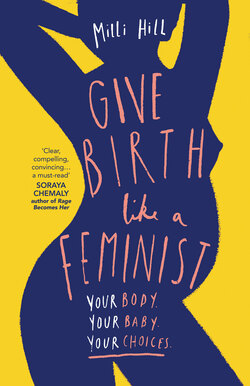Читать книгу Give Birth Like a Feminist - Милли Хилл - Страница 6
Chapter 1 ‘Am I Allowed?’: The Birth Room Power Imbalance
ОглавлениеThe most common way people give up their power is by thinking they don’t have any.
Alice Walker[1]
The year is 1975. A woman in a hospital nightgown, shaky on her feet, is wandering the corridor outside the labour ward, using the wall to support her. It’s 3 a.m. She is looking for something she has lost: her baby.
On the previous day several things happened to her that were ‘routine’. When I say ‘routine’, what I really mean is that nobody asked her permission. She was induced because she was past her due date. Her pubic hair was shaved off. She was given an enema. The opioid pethidine was injected into her thigh shortly before delivery. And her perfectly healthy baby was given to her and her husband to hold for a while, before being taken off to the hospital nursery for the night. She did not actively consent to any of this. It was just ‘how it was done’.
Ushered back to bed by the stern but kindly matron, my mother never questioned her experiences of birth until, several decades later, she began to hear a new narrative from the baby they had taken to the nursery – me. In the midst of my own pregnancy journeys, I started to ask questions. ‘How far past your due date were you?’ ‘Why did they shave women – was there any evidence to support this practice?’ ‘Did you ask for the pethidine?’, ‘Did they give me formula in the nursery?’
‘I don’t know. You didn’t really ask questions then.’
‘Why didn’t you just tell them you wanted to keep your baby with you?’
‘Well … they just didn’t let you do that I suppose. It just wasn’t allowed.’
‘They did not let me’, ‘I was not allowed’ … you would think these two phrases would be confined to the history books. And yet thirty-two years later, they were to become part of the fabric of my own first daughter’s birth story, when I was ‘not allowed’ a home birth but instead ‘had to’ be induced because I was past my expected due date, and then ‘had to’ have a forceps delivery, because current policy ‘did not let me’ spend longer than two hours in the pushing stage. There were countless other small incidents during my pregnancy, labour and birth in which what was about to happen to me was presented as ‘policy’ or ‘procedure’. The professionals I met were kind and caring, but I did not feel like I had been given a choice.
As a new mother, I contemplated all of this as I sat on my stitches and nursed my newborn in the long, isolated hours so typical of modern motherhood. I wondered – as an educated woman with a reputation for being ‘opinionated’, ‘persistent’, even ‘nasty’ (depending on the viewpoint of the observer) – how had this happened to me? I had laboured, as I had wanted to, free and naked, in a nest of blankets and cushions on the hospital floor. I had groaned and chanted, unfettered by drugs. I had gone to the abyss and fought my demons, as many labouring women need to do. And as I lay on that floor I had connected with my inner wild woman, with my maternal lineage, and with all the women who had been on this epic journey to meet their babies before me.
But somehow, I had been woken from this deep, almost hallucinatory trance, and moved from this place. A man had come and told me my time was up. I had been taken to the bed. I had been made to put on a shirt and cover my breasts. My feet had been placed in stirrups. I had said no to all this, but I had been told I ‘must’.
At the moment of birth, I called out, in almost sexual tones, ‘Oh, yes!’, as my daughter’s body finally slipped free. It’s true, it did feel like the most perfect, ecstatic release, but the way I vocalised it was quite conscious and deliberate. It was a clear message. I wanted the doctor to know that he had not taken this pleasure from me. I had been sanitised, covered up, conventionalised, conformed: this declaration of pleasure was my final act of rebellion.
The memory of this rather strangely timed two-finger salute to my obstetrician is evidence to me, as I look back on that day just over a decade later, that even in that moment, I already knew I’d been hoodwinked. Even though I had gone into the hospital with an academic understanding of many of the feminist issues that surround modern birth, and with the desire to avoid unnecessary intervention, I had somehow ended up with my feet in stirrups. It almost felt like I had become a living metaphor: the wild woman tamed, the naked woman clothed, the renegade woman cut, the mad woman put firmly back in the attic. No wonder I made that final rebel yell.
